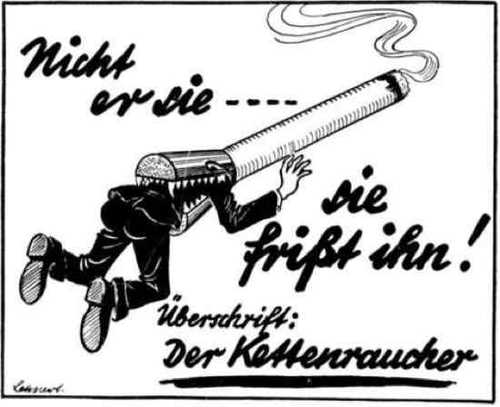
Homefront
Nazis against Nicotine.
Anti-smoking poster from the National Socialist government. Hitler is noted for his teetotalism and vegetarianism; in fact, he is known to have taken the odd slice of ham and glass of beer on rare, special occasions. He was much more consistent in his hostility to smoking, in which he never indulged, and which he would not tolerate at least in his immediate vicinity (must have been difficult in those beer cellars in the early days). The Nazis sponsored quite a vigorous anti-smoking campaign, stressing the dangers to health; incidentally giving the lie to claims often made that the health dangers of smoking were unknown until the latter part of the 20th century. In any event, the campaign seems to have enjoyed little success. Smoking remained a popular vice among German adults throughout the period of the Twelve Year Reich. Mind you, even in this matter, the Nazis managed to inject a bit of hypocrisy into their proceedings. I had often wondered where the Nazis got their tobacco during the war, when many of the more obvious and conventional sources were effectively cut off by the British/Allied blockade. Well, I find that the answer, to a very large extent, was Greece. This was true even before the war. Why, one might ask ? After all, Greek tobacco was (and is) not exactly up to Cuban or Virginian standards. The answer is that in the lead-up to the war, Germany sought to manipulate the economies and military establishments of weaker states to their east and south-east in various ways in order to maximise the degree of their dependence on Germany. In the case of Greece, their generally vile tobacco was (and is) one of their very few potentially viable export merchandise products. Germany cornered the market for Greek tobacco simply by offering premium prices for the stuff not justified by its quality. However, it also manipulated the payment system for such purchases from a position of strength to force the Greeks to spend the proceeds on German manufactured imports - including German military equipment. The "April 4" authoritarian Republican government of General Metaxas was well aware of what was happening and its implications, and did their best to maintain some diversity in their import procurement in general, and in military import procurement in particular. Nonetheless, the dependence of Greece on tobacco exports to secure all-too-scarce foreign exchange (in the absence of any significant help from Germany's potential enemies in the matter) meant that they had to continue playing this coercive economic game regardless. However strong the Fuhrer's negative views on smoking may have been, neither he nor Goering and his economic bureaucrats were willing to let them get in the way of the greater Nazi purpose ... Best regards, JR.
3681 Views
5/18/2012
